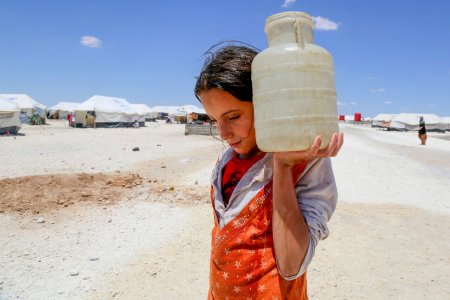
On 23 June, the Alouk water station in Al-Hasakeh Governorate ceased functioning, affecting direct access to water for approximately 460,000 people in north-east Syria, primarily Al-Hasakeh and Tal Tamer cities. In total, up to one million people are impacted, including 100,000 people in Al Hol and other IDP camps and settlements.
Prior to this latest disruption, Alouk had been operating at limited capacity since May due to a number of factors, including reduced access for technicians to carry out essential maintenance and repairs. Reports indicate that, prior to a full electricity cut to the station on approximately 26 June, as few as five out of 21 boreholes and one out of four horizontal pumps had been operational.
Consequently, water levels at Al-Himmeh reservoir, which is supplied by Alouk and serves in turn as the direct water source for Al-Hasakeh city, are now reported below minimum operating levels.
WASH sector partners have again activated emergency water trucking in response, delivering approximately 3,380 m3/day to an estimated 169,000 people across Al-Hasakeh city. While a necessary stop-gap measure, it is sufficient to cover only 20 per cent of daily water needs. Additional resources of US $2.5 million are urgently required to enable partners to increase water trucking to more cover the needs of all 460,000 people, and to install reverse osmosis units across Al-Hasakeh Governorate.
High-level advocacy is also ongoing to enable resumption of operations at Alouk water station, including the regular, unhindered and safe access for technical teams to the station, and related electrical and pipeline infrastructure.
Source: OCHA







